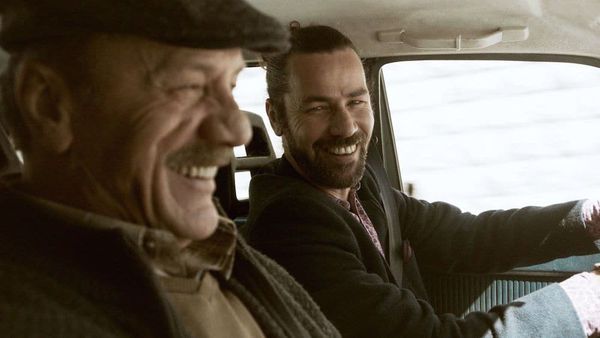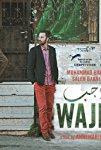Eye For Film >> Movies >> Wajib (2017) Film Review
Wajib
Reviewed by: Amber Wilkinson

Annemarie Jacir's characters may not leave the city of Nazareth as they take a circular road trip in Wajib but the emotional distance they travel is considerable. Abu Shadi and Shadi (played by real-life father and son Mohammad and Saleh Bakri) are tooling around in the elder's ratty old Volvo - he in a flat cap, enjoying fly cigarettes at every opportunity, his son bearing all the hallmarks of an ex-pat visit back home, with his hip clothes and man bun. They're delivering wedding invitations for Abu Shadi's daughter, Shadi's sister Amal (Maria Zreik).
"Duty is duty, that's wajib", we learn as they visit a succession of relatives and friends, both close and tangential, although these interludes are really just an excuse to examine the men's relationship and, more specifically, the differences in attitude between those who stay and those who leave. It's easy to wear a rose-coloured pair of designer Italian glasses when you are observing from a distance, whereas Shadi's father faces the compromises needed to rub along successfully in his homeland.

Wajib may translate as duty, but what does that really mean? A duty to return to your homeland, like Shadi, or Abu Shadi's commitment to the traditions associated with a wedding even if it means inviting an Israeli who has spent his life informing? What about the duty of Shadi's ex-wife to attend even though she is now living in another country with a different man? Or Shadi's duty to offer himself as a potential partner to the folks back home even though he has a girlfriend in Italy?
All these questions are gently explored by Jacir, mixing with universal family frustrations that will be familiar to most people who've left home, even if they haven't gone far. She maintains a light touch, filling the various visits with nicely worked comic moments - including a recalcitrant parrot - and decent emotional heft, such as when the two men help Amal pick out her dress. She perfectly captures the way that, in families, whether to screen off a view with tarpaulin can be as, or even more important than a political event and how these sorts of conversations can flow into one another. The politics of the Middle East are equally gently explored, used as a grace note rather than a driver.
The lensing by Antoine Heberle is workmanlike but its low-key style sits well with the generally unshowy nature of the film, that gradually builds its tensions without tipping into melodrama - simply acting as a platform on which its father and son stars can shine. In this, Jacir is handsomely rewarded - the Bakris burn bright.
Reviewed on: 20 Apr 2018
















